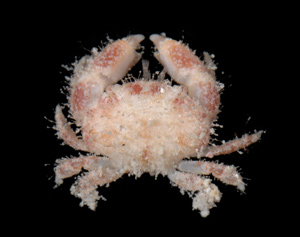True
Crabs of French Frigate Shoals
 |
Pseudoliomera
Family: Xanthidae
Photo: Gustav Paulay
|
By
Joel Martin
Phylum:
Arthropoda.
Subphylum: Crustacea.
Class: Malacostraca.
Order: Decopoda.
Infraorder: Brachyura
Click
here to see a colorful gallery of crabs found on this expedition!
Crabs
are among the most easily recognized of all marine invertebrates. Nearly everyone has an idea of what
a crab looks like. But actually, crabs come in a staggering variety
of sizes, shapes and colors, making it hard at times to define what a
crab really is. Like lobsters, shrimps, hermit crabs, and other
crustaceans with five pairs of legs, crabs are "decapods" (a
name that means "ten legs"). The "true" crabs
belong to a group of decapods called the Brachyura (meaning short-tailed),
in recognition of the fact that their tail (abdomen) is reduced in size
and is tucked under the body; the abdomen of a crab can only be seen
from below (or by holding the crab upside down). The abdomen
is wide in female crabs, in order for them to carry the egg mass after
eggs have been produced, and it is narrow and straighter in male crabs. All
crabs have the first pair of legs modified into pinching claws, and usually
these modified legs are heavier or longer than the remaining legs. This
leaves four pairs of legs for walking or swimming. But several
groups of crabs, including some that are found in the waters off French
Frigate Shoals, also have claws on the back legs. These legs are
specialized for holding pieces of sponges, sea fans, or other coverings
over the crabs as camouflage. Some crabs even have three pairs
of legs with claws on them. Most crabs are opportunistic feeders,
which really means that they will eat just about anything they come across.
But some are very specialized. For example, some of the species at
French Frigate Shoals live only on live corals and are adapted to eating
the mucous these corals produce; other species are found only on sea
cucumbers; some species are adapted to opening snail shells; some eat
algae; and on it goes. It is estimated that there are 5,000 different
kinds (species) of crabs in the world, which is about a third of all
known decapods. Only about 200 different species of crabs have
been reported from Hawaiian waters, but we are adding to that number
every day.
*All images and information from French Frigate Shoals are provided
courtesy of the Northwestern Hawaiian Islands Marine National Monument,
Hawaiian Islands National Wildlife Refuge, the Northwestern Hawaiian
Islands State Marine Refuge, and NOAA's Pacific Islands Fisheries
Science Center in accordance with permit numbers NWHIMNM-2006-015,
2006-01, 2006-017, and DLNR.NWHI06R021 and associated amendments.
Click
on one of the following areas to follow the expedition.
Ship
Logs:
Day-by-day
activities of the ship: what research is being done that
day, what the weather is like, what's for dinner, etc.
Journals:
Daily
or semi-daily personal journal entries by the particpants
in the expedition. These journals do not necessarily reflect
the positions of any of the agencies connected with this
project.
Interviews:
Interviews with expedition participants, scientists,
vessel crew, educators, etc.
Features:
Highlights or special information such as interesting
discoveries or related research.